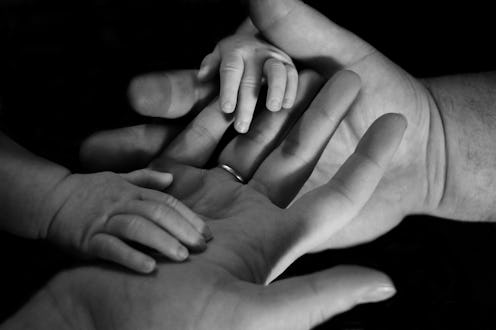Life
The Reason This Dad Couldn't Donate A Kidney To His Son Will Infuriate You
The National Kidney Foundation estimates that over 100,000 people are awaiting a potentially lifesaving kidney transplant. On average, most people wait over three and a half years. Unfortunately, of those on the waiting list for a new kidney, 13 die each day. Anthony Dickerson, the father of 2 year-old A.J. Burgess, intended to step up and donate a kidney to his son, who was born prematurely without a working kidney. Dickerson was a 100 percent match for his young son, but a day before the surgery, was denied the ability to go through with the donation. Dickerson, who has a history of theft and forgery charges, was released from jail Oct. 2 after getting arrested on Sept. 28 for violating the terms of his probation, according to NBC News. The Sheriff's Office acknowledged in a statement that it had worked diligently to make sure Dickerson would be free before his son's surgery on October 3.
According to Burgess’ mother, hospital staff informed the family that Dickerson’s probation violation required him to demonstrate three to four months of good behavior before the transplant would be considered again. But three to four months may be too long for Burgess to wait. His mother says that his body is failing and he now needs bladder surgery, in addition to the transplant.
Emory Healthcare released a statement to WGCL-TV about the case after it garnered local media attention, according to CBS. They said, "Emory Healthcare is committed to the highest quality of care for its patients. Guidelines for organ transplantation are designed to maximize the chance of success for organ recipients and minimize risk for living donors."
Dickerson’s match status hasn’t changed. He is still a perfect match for his son and wants to go through with the procedure. According to the CBS News, Burgess' mother believes the hospital is "unfairly endangering her son" because of his father's parole status.
Providing subpar care to incarcerated or formerly incarcerated people is common in the United States. One alarming example is the shackling of pregnant inmates. Only 22 states and Washington, D.C. have laws against shackling incarcerated pregnant women, and those laws are often ignored. Shackling pregnant women during transportation to and from doctor’s appointments increases the chances of tripping and falling, which can be harmful to the mother and the fetus. Wrist, ankle, and stomach restraints are even used during labor. Limited movement can lead to the fetus being in the wrong position in the womb, and these restraints make it harder for hospital staff to perform their jobs and intervene during emergencies. There is no safety or security justification for shackling these women, as there has been no reported cases of pregnant inmates attempting to escape or harm themselves, correctional staff, or medical staff.
Additionally, the needs of mentally ill inmates are often ignored by jail staff until it’s too late. A 2016 investigation into Armor Correctional Health Services of Miami, a private company paid to handle jail health care, found that staff’s failure to protect mentally ill patients had deadly consequences. The cases of neglect at Armor Correctional Health are part of a chilling pattern of profits before patients. People who are incarcerated are all too often seen as numbers that can impact a company’s bottom line, instead of people with hopes and aspirations for their lives after incarceration.
Anthony Dickerson aspired to save his son’s life. Emory Healthcare is postponing a potentially lifesaving procedure for reasons unrelated to the well-being of an innocent toddler. What has happened to Dickerson and his son is yet another example of how the incarcerated and the formerly incarcerated are often the victims of undue stigma against incarcerated people, a stigma that desperately needs to be broken.
